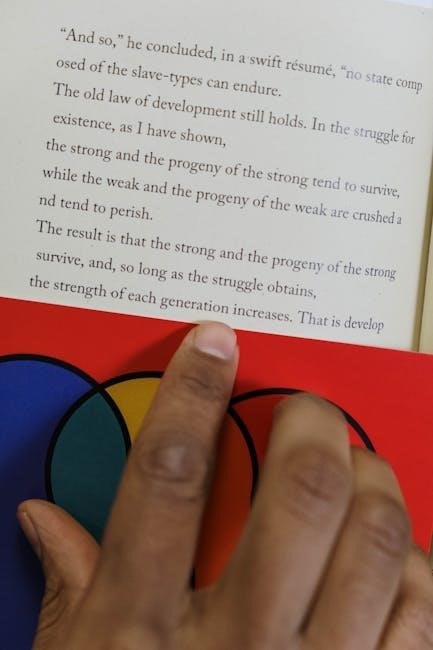Year 6 Reading Comprehension PDF: A Comprehensive Guide
This guide provides essential resources and strategies for improving reading comprehension skills in Year 6 students. It includes engaging passages, challenging questions, and practical tips to enhance understanding and critical thinking abilities effectively.
Year 6 Reading Comprehension PDFs are tailored resources designed to enhance reading skills for students aged 10-11. These documents typically include engaging stories, poems, and informative texts, accompanied by challenging questions. They are aligned with curriculum standards, ensuring relevance and effectiveness. The PDFs cater to various learning needs, offering differentiated activities to support students at all levels. Many feature a range of genres, from fiction to non-fiction, and include topics like adventure, history, and science. Questions are often labeled using the VIPERS framework, focusing on key comprehension skills such as vocabulary, inference, and summarization. These resources are popular among educators and parents, providing structured practice for students preparing for assessments like SATs. The PDF format makes them easily accessible and printable, allowing for flexible use in classrooms or at home. By offering diverse texts and thought-provoking questions, Year 6 Reading Comprehension PDFs help students build strong foundational reading skills and critical thinking abilities.

Importance of Reading Comprehension for Year 6 Students
Reading comprehension is vital for Year 6 students as it enhances critical thinking, vocabulary, and analytical skills, preparing them for SATs and fostering a deeper understanding of complex texts across various subjects.
Why Reading Comprehension is Critical at This Stage
Reading comprehension is critical for Year 6 students as it bridges the gap between foundational literacy skills and advanced academic demands. At this stage, students encounter more complex texts, requiring deeper understanding and analysis. Developing strong comprehension skills enables them to interpret a variety of genres, including fiction, non-fiction, and poetry, which are essential for success in exams like SATs. Additionally, reading comprehension fosters critical thinking, vocabulary expansion, and the ability to extract key information, all of which are vital for academic progress. It also enhances communication skills, as students learn to articulate their understanding of texts effectively. Furthermore, comprehension skills are transferable across subjects, such as history, science, and literature, making it a cornerstone of overall educational development. By mastering reading comprehension, Year 6 students build a strong foundation for future learning and lifelong reading enjoyment.

Features of Year 6 Reading Comprehension PDFs
Year 6 Reading Comprehension PDFs feature engaging stories, thought-provoking questions, and challenging activities. They include diverse genres, Lexile-aligned texts, and VIPERS questioning, ensuring alignment with curriculum standards and promoting skill development effectively.
- Engaging stories to captivate young readers.
- Thought-provoking questions to test understanding.
- Challenging activities to enhance critical thinking.
- Alignment with curriculum standards for structured learning.
Types of Passages and Questions Included

Year 6 Reading Comprehension PDFs include a wide variety of passages and questions designed to cater to different learning needs and styles. The texts cover diverse genres such as fiction, non-fiction, poetry, and biographies, ensuring students are exposed to a broad range of topics and themes.
The questions are carefully crafted to assess comprehension skills, with a focus on VIPERS (Vocabulary, Inference, Prediction, Explanation, Retrieval, and Summarising). These questions encourage critical thinking and deeper understanding of the material.
- Fiction passages include engaging stories and characters to spark imagination and curiosity.
- Non-fiction texts cover topics like science, history, and environmental studies, promoting knowledge acquisition.
- Poetry and biography passages enhance literary analysis and appreciation skills.
- Questions range from simple retrieval to complex inferential and explanatory tasks.
These resources are aligned with curriculum standards, ensuring they meet the learning objectives for Year 6 students and prepare them effectively for assessments like SATs.
Alignment with Curriculum Standards
Year 6 Reading Comprehension PDFs are meticulously designed to align with national curriculum standards, ensuring students meet key learning objectives. These resources are tailored to match the expectations for Year 6 students in England, P7 in Scotland and Ireland, and other equivalent levels globally.
The passages and questions are structured to reflect the skills assessed in standardized tests like SATs, covering areas such as vocabulary, inference, and text analysis. The Lexile levels, ranging from 890L to 980L, ensure the materials are appropriately challenging for students aged 10-11.

- Curriculum alignment ensures consistency with classroom teaching and national expectations.
- Skills progression is built into the resources to support continuous development.
- Assessment preparation is a key focus, helping students familiarize with test formats and question types.
By using these PDFs, teachers and parents can confidently support students in achieving their full potential in reading comprehension and beyond.

How to Use Year 6 Reading Comprehension PDFs Effectively
Maximize the effectiveness of Year 6 Reading Comprehension PDFs by incorporating interactive lessons, differentiated activities, and regular practice. Utilize curriculum-aligned resources, video tutorials, and creative tasks to engage students and enhance their reading skills effectively.
Tips for Students to Improve Their Skills
To enhance reading comprehension, students should start by carefully reading the passage and identifying the main idea. Understanding vocabulary is crucial, so learners should look up unfamiliar words. Encourage active reading by annotating key points and asking questions. Practicing regularly with varied texts, such as fiction, non-fiction, and poetry, helps build confidence. Students should also focus on answering questions using evidence from the text, ensuring responses are clear and concise. Utilizing the VIPERS framework—Vocabulary, Inference, Prediction, Explanation, Retrieval, and Summarise—can guide students in approaching comprehension systematically. Encourage setting goals, like completing a set number of passages weekly, and reviewing mistakes to learn from them. Engaging in discussions about texts and seeking feedback from teachers or peers can further improve understanding. Additionally, incorporating creative activities, such as drama or writing tasks based on the text, can deepen comprehension. Consistent practice and a love for reading are key to mastering Year 6 reading comprehension skills.
Strategies for Teachers to Implement in Classrooms

Teachers can enhance Year 6 reading comprehension by implementing targeted strategies. Start with differentiated instruction to cater to varying learning needs, ensuring all students engage with the material. Utilize pre-recorded videos and interactive quizzes to create dynamic lessons. Incorporate creative activities, such as drama or art projects, to deepen understanding of texts. Encourage peer discussions and feedback sessions to foster collaborative learning. Integrate technology, like educational apps, to provide additional practice opportunities. Regularly review progress and adjust teaching methods to address gaps. Use the VIPERS framework to guide comprehension lessons, focusing on key skills like inference and summarization. Provide explicit instruction on vocabulary and comprehension techniques, reinforcing concepts through modeling. Encourage students to read widely and often, exposing them to diverse genres and themes. Offer one-on-one support for struggling learners and celebrate progress to build confidence. Consistent practice and positive reinforcement are essential for improving reading comprehension skills in Year 6 students.

Assessing Progress and Understanding

Assessing Year 6 reading comprehension involves regular quizzes, creative activities, and mark schemes. Teachers use PDF resources with fiction, non-fiction, and poetry to evaluate skills. Progress is tracked through varied passages and VIPERS questions, ensuring comprehensive understanding of texts.
Resources and Materials for Further Practice
Year 6 students can benefit from a wide range of resources designed to enhance reading comprehension skills. PDF files containing engaging stories, thought-provoking questions, and challenging activities are readily available online. These materials cover various genres, including fiction, non-fiction, and poetry, ensuring diverse exposure to different text types. Many resources are aligned with curriculum standards, such as Lexile measures and the national curriculum, making them ideal for structured learning. Worksheets, comprehension passages, and creative activities are included to cater to different learning styles. Additionally, websites like BBC Bitesize offer daily lessons and quizzes tailored for Year 6 students. Teachers can also access mark schemes and progress tracking tools to assess student performance effectively. These resources are perfect for both classroom use and home learning, providing students with ample opportunities to practice and refine their reading comprehension skills in a fun and interactive way.
